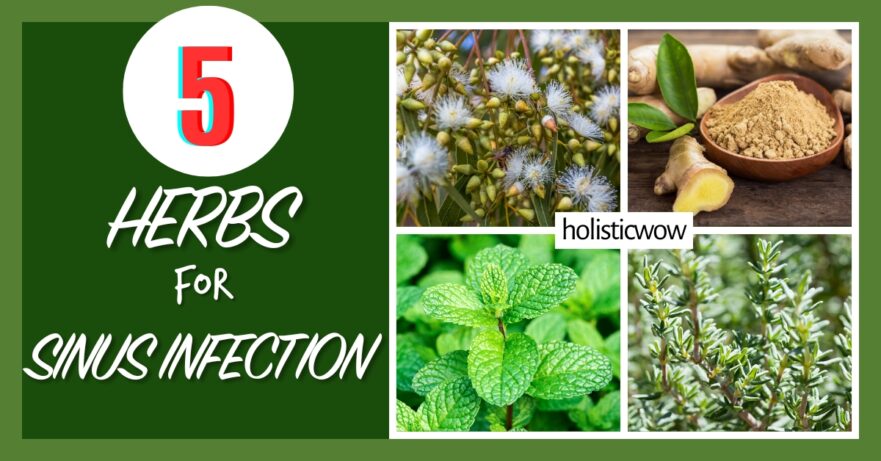In this article about herbs for sinus infection:
🌿 Best Herbs for Sinus Infection | 📜 Herbal Preparations and Recipes for Sinus Infections | ☯️ Integrating Herbs into Daily Life for Sinus Relief | 🌱 Navigating Herbs Safely
Sinus infections can cause significant discomfort, including facial pain, nasal congestion, and headaches. These infections occur when the nasal passages become inflamed, often due to viral or bacterial causes, leading to mucus buildup and pressure in the sinuses.
Herbs like eucalyptus, peppermint, and ginger may naturally relieve sinus infections. These plants contain compounds that can help reduce inflammation, clear congestion, and boost the immune system, potentially shortening the duration of the infection.
Using these herbs in teas, steam inhalations, or essential oil diffusers can provide effective relief. However, it’s important to use them correctly and consult with a healthcare provider if symptoms persist or worsen.
Key Takeaways
- 🍃 Eucalyptus benefits: Eucalyptus acts as a powerful decongestant, helping to clear mucus and reduce nasal swelling, although its regular use for preventing recurring sinus infections is not strongly supported by evidence.
- 🌱 Peppermint’s dual action: Peppermint contains menthol, which may relieve congestion and provide a cooling, soothing effect on irritated sinus tissues, though more research is needed to confirm its impact on sinus infections.
- 🫚 Ginger’s anti-inflammatory properties: Ginger has anti-inflammatory properties that may help reduce sinus inflammation and potentially thin mucus to promote drainage, though evidence in humans is limited.
- 🔥 Turmeric for pain relief: Turmeric’s active compound, curcumin, has anti-inflammatory effects that may help alleviate sinus pain and pressure, but its low bioavailability limits its effectiveness unless combined with black pepper.
- 🌿 Thyme’s antimicrobial effects: Thyme contains compounds with antimicrobial properties, such as thymol and carvacrol, which may help fight pathogens contributing to sinus infections, though more human studies are needed to confirm this.
🌿 Best Herbs for Sinus Infection
Sinus infections, or sinusitis, can cause significant discomfort and interfere with daily life. This condition occurs when the nasal passages become inflamed, leading to uncomfortable symptoms. Eucalyptus (Eucalyptus globulus), peppermint (Mentha piperita), ginger (Zingiber officinale), turmeric (Curcuma longa), and thyme (Thymus vulgaris) are herbs traditionally thought to address sinus issues.
Sinusitis typically presents with facial pain or pressure, nasal congestion, thick nasal discharge, and reduced sense of smell. Other common symptoms include headache, ear pain, cough, and fatigue. Sinus infections can be acute, lasting up to 4 weeks, or chronic, persisting for 12 weeks or longer.
The most frequent causes of sinusitis include viral infections like the common cold, allergies, and, less frequently, bacterial infections. Structural issues in the nasal passages or a weakened immune system can sometimes contribute to recurrent sinus infections. Understanding these symptoms and causes is crucial for effectively managing sinus health and exploring complementary herbal remedies.
Eucalyptus (Eucalyptus globulus)
Eucalyptus (Eucalyptus globulus) has long been used as a natural remedy for respiratory issues, particularly for its decongestant properties. It contains a compound called cineole, which has antimicrobial and anti-inflammatory effects, making it potentially helpful for relieving sinus infection symptoms like congestion and nasal swelling. Some studies suggest that inhaling eucalyptus steam or using diluted eucalyptus oil in a diffuser can temporarily relieve sinus pressure and help open airways, easing breathing. Cineole, the primary active compound in eucalyptus, has been shown to improve symptoms of acute respiratory conditions, including sinusitis, when used alongside other treatments. A non-interventional survey found that cineole, the main component of eucalyptus oil, significantly reduced symptoms associated with the inflammation of the nasal passages and sinuses, improving quality of life in 90% of participants over seven days, with good tolerability and minimal side effects [1]. However, no strong evidence supports that regular use of eucalyptus can prevent recurring sinus infections. Additionally, using eucalyptus oil cautiously is important, as it can cause irritation or allergic reactions if not properly diluted.
Peppermint (Mentha piperita)
Peppermint (Mentha piperita) is well-known for its cooling effects on the respiratory system, largely due to menthol, a compound that acts as a natural decongestant with mild numbing properties. Some evidence suggests that peppermint may help relieve sinus pressure and pain by temporarily opening nasal passages, promoting easier breathing. However, there is limited direct evidence supporting peppermint’s effectiveness against the bacteria or viruses that cause sinus infections in humans. Inhaling peppermint steam or using diluted peppermint oil may temporarily relieve sinus congestion, but more clinical research is needed to confirm its long-term benefits. Peppermint’s anti-inflammatory properties may reduce inflammation in the nasal passages, which could help decrease mucus production and relieve congestion. The menthol in peppermint has analgesic effects, which may help provide pain relief, including for headaches, though more specific research on its impact on sinus-related headaches is needed [2].
Ginger (Zingiber officinale)
Ginger (Zingiber officinale) is a well-known herb with anti-inflammatory and antioxidant properties, and it has been used for centuries in traditional medicine. Ginger contains compounds like gingerols and shogaols, which may help reduce inflammation in the sinuses. These compounds also have some antimicrobial activity, potentially helping fight bacteria or viruses contributing to sinus infections, though evidence in humans is limited. Ginger can help thin mucus and ease congestion. Drinking ginger tea or adding fresh ginger to meals may provide some relief from sinus pain and pressure. However, no strong evidence suggests that regular consumption of ginger prevents sinus infections, but it may support immune function due to its antioxidant properties. Ginger’s warming sensation can soothe sore throats that often accompany sinus infections, and its circulation-boosting effects may help relieve facial pain and pressure associated with sinusitis. However, more research in humans is needed to confirm this.
Turmeric (Curcuma longa)
Turmeric (Curcuma longa) is a well-known anti-inflammatory herb with curcumin as its active compound. Curcumin’s anti-inflammatory and antioxidant properties may help reduce swelling in the nasal passages and sinuses, potentially alleviating symptoms of sinus infections like pain and congestion. However, curcumin’s low bioavailability limits its effectiveness unless combined with agents like piperine to enhance absorption [3]. Some studies suggest that curcumin can modulate the immune system and reduce inflammation. Still, there is limited direct evidence supporting its ability to fight the specific pathogens that cause sinus infections in humans. While curcumin exhibits antimicrobial effects in lab settings, its impact on sinus infection pathogens and overall clinical effectiveness requires more human research [4].
Thyme (Thymus vulgaris)
Thyme (Thymus vulgaris) is a herb with antimicrobial and potential expectorant properties, which may help manage sinus infections. It contains compounds like thymol and carvacrol, which have shown antibacterial and antifungal activity in lab studies [5]. These properties suggest thyme may assist in fighting pathogens contributing to sinus infections, though more human studies are needed to confirm its effectiveness in this context. As an expectorant, thyme might help loosen mucus and ease congestion, though the evidence for this in humans is limited. Drinking thyme tea or using thyme essential oil in steam inhalation can provide temporary relief by helping clear nasal passages and reduce sinus pressure. Thyme’s anti-inflammatory properties may also help reduce swelling in the sinuses, alleviating pain and discomfort. While thyme may support overall respiratory health, there is limited evidence that it prevents recurring sinus infections.
📜 Herbal Preparations and Recipes for Sinus Infections
Herbal remedies have been used for centuries to support respiratory health and ease sinus-related symptoms. These herbal preparations complement conventional approaches to managing sinus infections, offering natural support through the beneficial properties of herbs. Each recipe in this guide targets different aspects of sinus infections—relieving congestion, reducing inflammation, or supporting immune health. While these blends may provide soothing relief, it’s important to consult a healthcare provider before beginning any new herbal regimen, especially if you have existing health conditions or are taking medications.
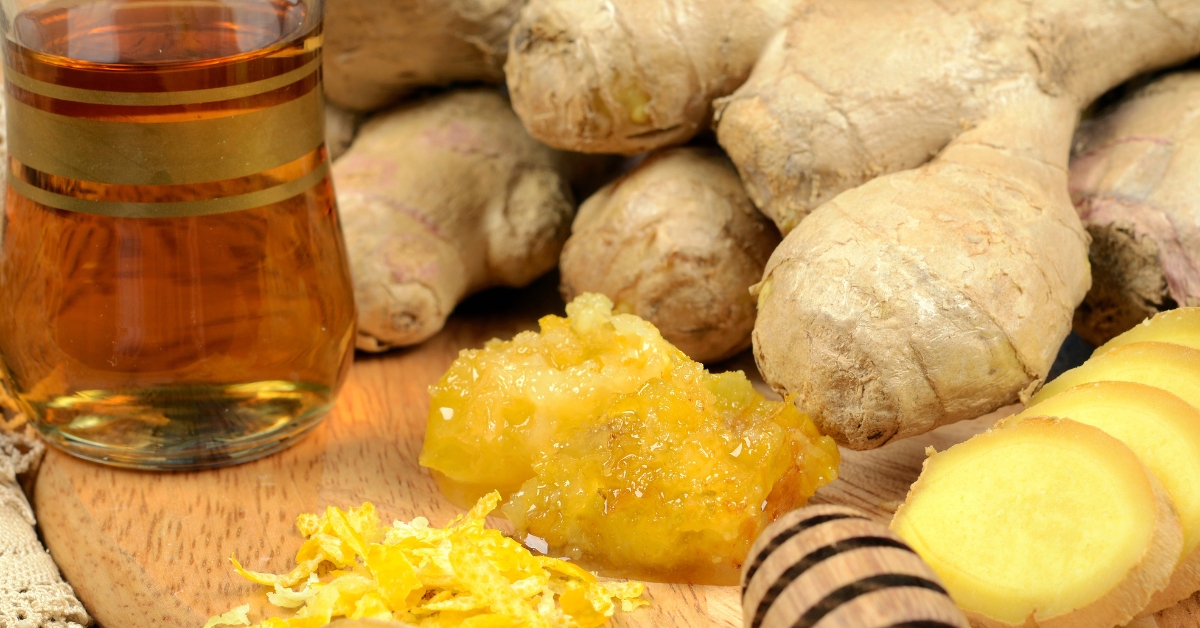
Sinus Comfort Tea
Ingredients:
- 1 teaspoon dried peppermint leaves
- ½ teaspoon dried thyme
- ½ teaspoon grated fresh ginger
- 1 cup of boiling water
Preparation:
- Combine all herbs in a teapot.
- Add boiling water and steep for 10 minutes.
- Strain and drink 2-3 times daily to soothe sinus discomfort and promote drainage.
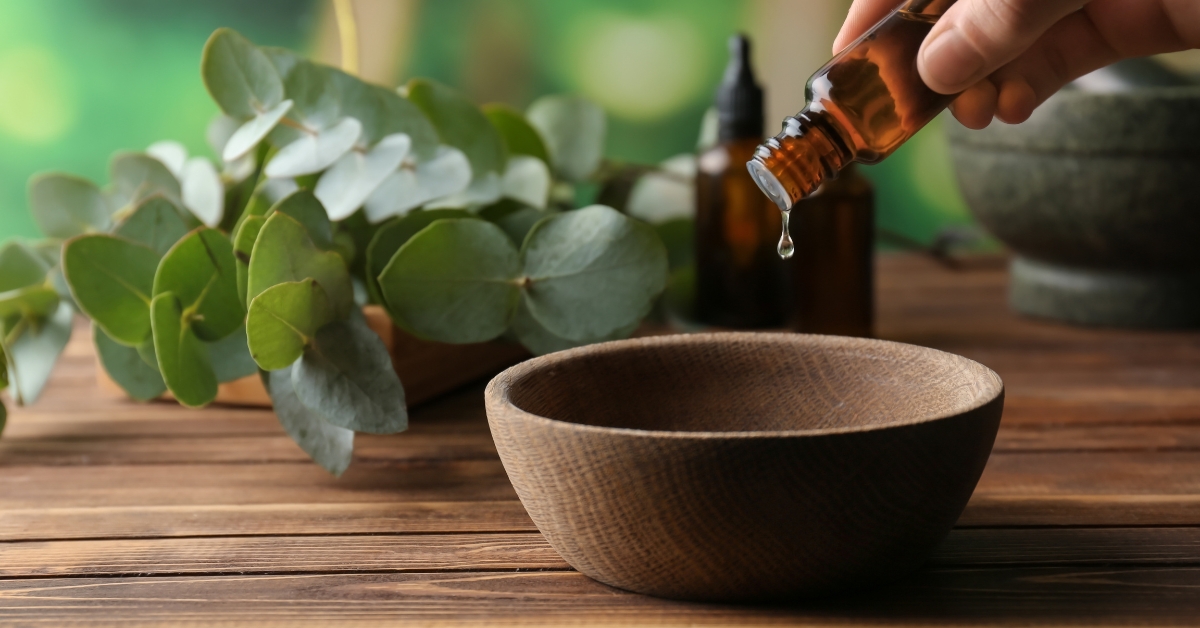
Decongestant Steam Inhalation
Ingredients:
- 2 drops eucalyptus essential oil
- 2 drops peppermint essential oil
- 1 quart of hot water
Preparation:
- Add essential oils to hot water in a bowl.
- Drape a towel over your head and inhale the steam for 5-10 minutes, twice daily, to clear nasal passages and reduce congestion.
- Do not ingest or apply essential oils directly to the skin.
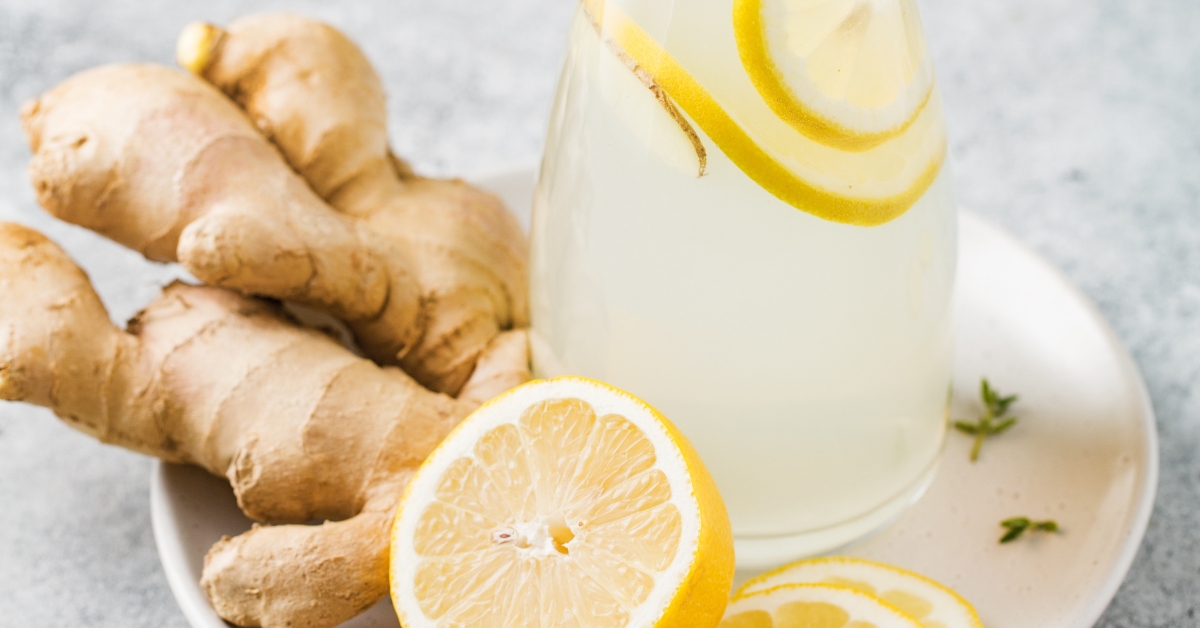
Anti-Inflammatory Sinus Tonic
Ingredients:
- 1 teaspoon grated fresh turmeric
- 1 teaspoon grated fresh ginger
- ½ teaspoon dried thyme
- 1 cup of hot water
- Pinch of black pepper
Preparation:
- Mix all ingredients in a mug.
- Steep for 10 minutes, strain, and drink once daily to reduce sinus inflammation and support immune function.
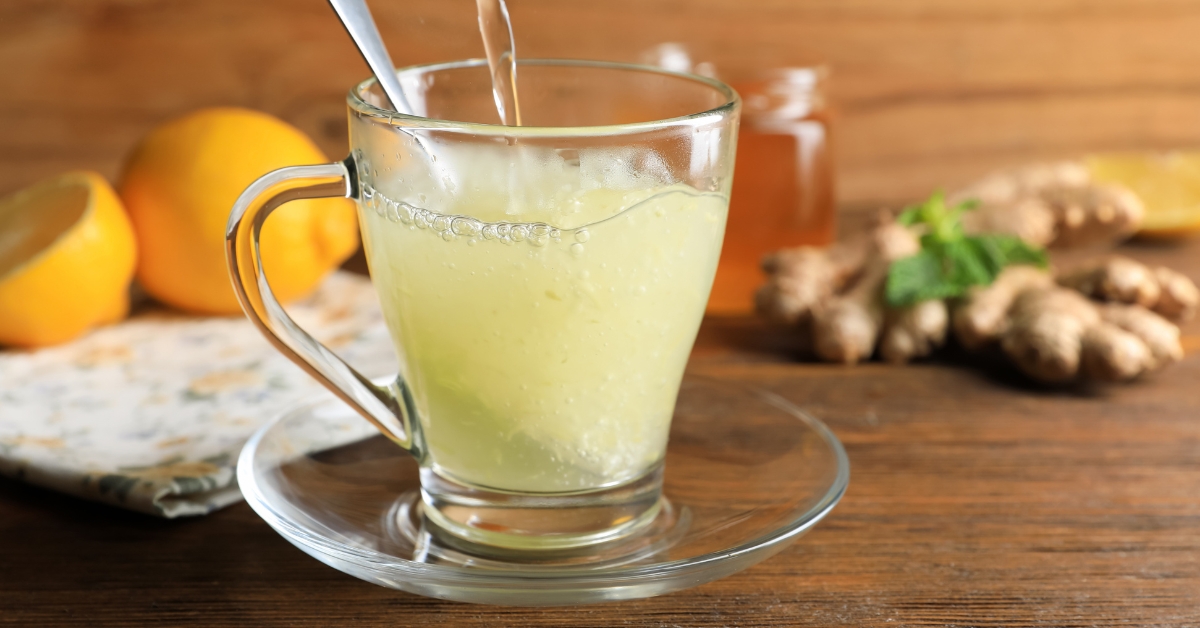
Powerful Sinus Clearing Blend
Ingredients:
- 1 teaspoon dried peppermint leaves
- ½ teaspoon dried thyme
- ½ teaspoon grated fresh ginger
- ½ teaspoon ground turmeric
- 1 cup of boiling water
Preparation:
- Combine all herbs in a teapot.
- Add boiling water and steep for 15 minutes.
- Strain and drink twice daily for sinus relief and to potentially fight infection.
These recipes are designed to be easily integrated into daily routines, offering a practical approach to managing sinus health naturally. Adjust the blends according to personal preference and consult a healthcare provider before starting any new herbal regimen, especially if you have existing health conditions or are taking medications.
☯️ Integrating Herbs into Daily Life for Sinus Relief
Incorporating herbs into your daily routine may help improve sinus health and provide some relief from sinus infections. Here are practical tips for effectively using herbs and complementary practices to maximize their benefits.
Daily Use and Lifestyle Integration
- 💨 Herbal Steam Inhalation: Start your day with an inhalation of eucalyptus and peppermint steam. This practice helps clear nasal passages and can temporarily relieve congestion. However, essential oils should not be ingested or applied directly to the skin without dilution, and caution should be taken if you have asthma or respiratory issues.
- 🫖 Herbal Teas: Drink herbal teas containing ingredients like ginger, turmeric, or thyme regularly throughout the day. These herbs have anti-inflammatory and antioxidant properties that may help reduce inflammation. They can be prepared in the morning and carried in a thermos for convenient consumption.
- 👃 Nasal Rinse: Use a traditional saline solution for nasal rinsing once or twice daily to cleanse and soothe nasal passages. Saline rinses can help remove mucus and allergens, promoting clearer nasal passages and potentially reducing sinus discomfort.
- 🫚 Culinary Integration: Incorporate ginger and turmeric into your meals. Add fresh ginger to stir-fries or smoothies, and use turmeric in soups or golden milk before bed. These spices have anti-inflammatory properties that may support overall health.
Additional Practices to Support Sinus Health
- 🫗 Hydration: Drink plenty of water throughout the day to help thin mucus and support overall sinus health. Herbal teas count towards your daily fluid intake.
- 💦 Humidification: Use a humidifier with water only, without essential oils, to maintain moisture in the air. Essential oils like eucalyptus or thyme can be added to a diffuser for aromatic benefits. However, directly adding oils to a humidifier can damage the machine and lead to overexposure.
- 🥦 Diet Modifications: Some evidence suggests reducing the consumption of dairy and sugar, which may increase mucus production in certain individuals, although this effect varies from person to person. Increase intake of anti-inflammatory foods like leafy greens and omega-3-rich fish.
- 🏃♀️ Exercise: Engage in moderate exercise like brisk walking or yoga to improve circulation and support overall immune function. Exercise may also help reduce inflammation, which can benefit sinus health.
- 🧘♀️ Stress Management: Practice stress-reduction techniques such as deep breathing or meditation, as stress can exacerbate sinus issues by weakening the immune system and increasing inflammation.
Integrating these herbs and practices into your daily life may help manage sinus infections and promote overall respiratory health. Remember to start with small amounts of herbs to see how your body reacts, especially if you have ongoing sinus issues or are taking other medications. Always consult a healthcare provider before making significant changes to your health regimen, particularly if using herbs or supplements regularly.
🌱 Navigating Herbs Safely
Starting with small doses is the first step when adding herbal remedies to your health routine. This approach lets you see how you respond and adjust amounts for the best effect, keeping safety in mind. While many herbs are safe, everyone’s body reacts differently. If you notice any side effects, it’s important to stop and think about what might be causing them.
Remember, herbs can sometimes interact with prescription medicines. These interactions might make your medicines work too well or not well enough, so talking to a healthcare provider or an herbalist is essential. This is especially crucial if you’re pregnant, breastfeeding, taking medications regularly, or have an existing health condition. Getting advice tailored to your situation can help you avoid any unnecessary risks.
For kids and older adults, being extra careful with herbs is important. Their bodies might react more strongly to herbal remedies, and the chance of side effects or interactions could be greater. Before giving herbal treatments to children or elderly family members, getting advice from a professional is a must to ensure their safety.
By being cautious and seeking expert advice when needed, you can make herbal remedies a safe part of your wellness plan. This careful approach allows you to enjoy the benefits of herbs while keeping yourself and your family safe.
We explored natural herbal remedies for managing sinus infections and promoting nasal health. We focused on five key herbs: eucalyptus, peppermint, ginger, turmeric, and thyme. Each herb offers unique benefits for sinus relief, including decongestant, anti-inflammatory, and antimicrobial properties.
There are practical ways to incorporate these herbs into daily routines through teas, steam inhalations, and culinary uses. Additionally, we discussed complementary lifestyle practices to enhance the effectiveness of herbal remedies. These include proper hydration, humidifier use, dietary modifications, regular exercise, and stress management techniques.
While highlighting the potential benefits of these natural approaches, we emphasize the importance of starting with small amounts of herbs and consulting healthcare providers, especially those with ongoing sinus issues or taking medications. This balanced approach aims to support sinus health naturally while ensuring the safe and effective use of herbal remedies.
FAQ
What are the most effective herbs for treating sinus infections?
The most effective herbs for managing sinus infections may include eucalyptus (Eucalyptus globulus), peppermint (Mentha piperita), ginger (Zingiber officinale), turmeric (Curcuma longa), and thyme (Thymus vulgaris). Eucalyptus contains cineole, which has shown potential as a decongestant and anti-inflammatory agent that may help clear mucus and reduce swelling in the nasal passages. Peppermint contains menthol, which may act as a natural decongestant and provide a cooling, soothing effect. Ginger has anti-inflammatory properties that may help reduce sinus inflammation and thin mucus, though more human studies are needed to confirm its efficacy in sinus infections. Turmeric’s active compound, curcumin, is a potent anti-inflammatory. Still, its bioavailability is low unless taken with agents like black pepper, and more evidence is needed to support its role in sinus relief. Thyme has antimicrobial and potential expectorant properties, which may assist in fighting off pathogens and loosening mucus. These herbs can complement each other in addressing various aspects of sinus infections, from reducing inflammation and congestion to supporting immune function, though they should not replace conventional treatments.
How can I safely use these herbs to treat my sinus infection at home?
You can safely use herbs to help manage sinus infections at home through various methods. One effective approach is to prepare herbal teas using a combination of peppermint, ginger, and thyme. Steep these herbs in hot water for 10 minutes, strain, and drink 2-3 times daily. While these herbs may provide relief, their direct impact on sinus infections is not fully supported by human studies. Try steam inhalation with eucalyptus or peppermint essential oils for immediate relief. Add a few drops of the oil to a bowl of hot water, drape a towel over your head, and inhale the steam for 5-10 minutes. Be cautious not to use too much oil, as concentrated steam can irritate the respiratory system, especially those with asthma or sensitive airways. You can also create a sinus-clearing tonic by mixing fresh ginger and turmeric with hot water and a pinch of black pepper to enhance absorption. This tonic may help reduce inflammation due to the anti-inflammatory properties of ginger and curcumin. For topical application, always dilute eucalyptus or peppermint essential oil with a carrier oil (like coconut or almond oil) before applying it to your chest or under your nose. Essential oils should never be applied directly to the skin without dilution, which can cause irritation or allergic reactions. Avoid applying essential oils directly under your nose, as they can irritate, especially in sensitive areas. Remember to start with small amounts of herbs or oils to test your tolerance and ensure you do not experience any adverse reactions. If symptoms persist or worsen, consult a healthcare professional. These home remedies may provide relief, but they should complement, not replace, conventional treatments when necessary.
Are there any potential side effects or interactions I should be aware of when using herbs for sinus infections?
While herbs may help manage sinus infections, it's important to be aware of potential side effects and interactions. Eucalyptus and peppermint essential oils can cause skin irritation or allergic reactions if not properly diluted. These oils should also be used with caution around young children and pets, as inhaling concentrated essential oils can cause respiratory issues. Eucalyptus, in particular, should not be used on or near the faces of infants or young children due to the risk of breathing problems. While generally safe, ginger can cause heartburn, digestive discomfort, or mouth irritation in large amounts. People with bleeding disorders or those taking blood thinners should be cautious, as ginger may increase the risk of bleeding. Turmeric is safe for most people when used in moderate amounts, but high doses can cause stomach upset, nausea, or diarrhea. It may also interact with blood thinners, diabetes medications, and medications that reduce stomach acid. Thyme is typically safe when used in culinary amounts, but excessive use, particularly in the form of thyme oil, can lead to digestive upset or allergic reactions in some individuals. It's crucial to remember that herbal remedies can interact with certain medications. For example, turmeric may interact with blood thinners and diabetes medications, and ginger may also interact with blood-thinning medications. If you're pregnant, nursing, or taking any medications, it's essential to consult with a healthcare provider before using herbal remedies. Additionally, if you have allergies to plants in the mint family (Lamiaceae), such as basil, lavender, or sage, you should avoid peppermint and thyme, as they can trigger allergic reactions. Always start with small amounts of any new herb to test your body's reaction, and discontinue use if you experience any adverse effects.

